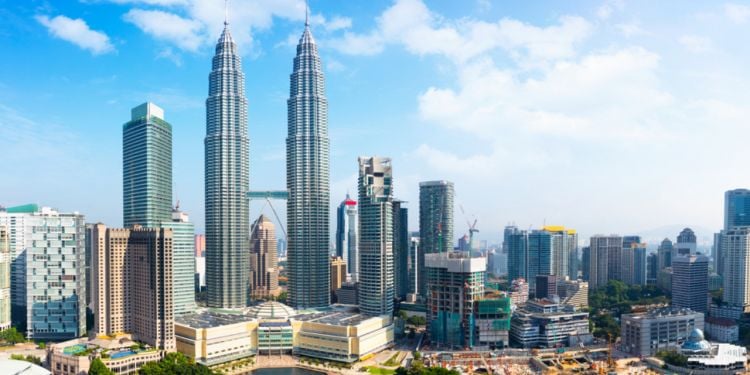
As the commercial and financial center of Southeast Asia, Malaysia attracts foreign investors from all over the world. Thanks to its extensive transport network, the country is well connected and is a very accessible base from which to do business, particularly in the industrial, service or industrial and export sectors.
Malaysia is the 28th largest exporting economy in the world. In 2021, which was marked by the global economic crisis, the country exported $92.31 billion worth of goods globally, representing a 47.3% increase from the previous year. Its three main export sources are electrical equipment, including integrated circuits, chemicals, and liquefied natural gas.
Statistics from the International Monetary Fund's World Economic Outlook Database show that Malaysia's total gross domestic product was $380 billion in 2021. This means that exports accounted for around 23.5% of Malaysia's total economic output.
Most foreign entrepreneurs choose to settle in Kuala Lumpur, but several development campaigns and initiatives across the country have been designed to attract foreign investment which is gaining momentum in places like Johor Bahru. Please note that entry formalities in Malaysia are complicated and vary accordingly to your nationality, the reason for your visit, and other factors.
What type of businesses can you start as a foreigner?
First of all, you will need to check that the type of business you wish to do in Malaysia is allowed for foreigners. The Malay government wants to ensure that there is enough work for Malays first, so foreigners are not encouraged to develop businesses or apply for jobs in Malaysia in certain government-led sectors, such as medical fields, pharmaceuticals, textiles, minerals, wood and the food industry.
On the other hand, Malaysia is committed to attracting foreigners into the industrial and service sectors. The government's new economic model has been designed to drive Malaysia from a middle-income economy to a high-income economy, and greater emphasis will be placed on developing the service sector to support the economy. In Malaysia's 11th Plan 2016-2020, the service sector was targeted as the main driver of economic growth.
Over the past 30 years, the main growth sectors in Malaysia have been automotive, defense and the oil sector. More recently, the country has experienced a digital revolution, with a growing proportion of companies operating in various high-potential sectors. Aeronautics, FinTech, electronics, services and digital are now considered to be among the biggest growth drivers in Malaysia.
Recognizing the potential growth in the service sector, the Malaysian government decided to liberalize 27 service subsectors in 2009 in order to attract more foreign investment and bring in more professionals. These subsectors include health and social services, tourism, transportation services, business services, and computer services. The government liberalized seven additional sectors in 2012 to allow foreign equity participation, up to 100% in phases. These sectors include telecommunications, healthcare, professional, environmental and education services.
Malaysian growth has been severely slowed by the global economic crisis caused by the Covid-19 pandemic. However, experts predict a recovery in 2022, which is expected to accelerate in 2023. In 2020, Malaysia posted negative growth of -5.6%. The forecast growth rate for 2021 is still negative but the trend is upwards, with -0.9%. According to the International Monetary Fund (IMF), Malaysia is expected to grow by 5.75% in 2022. See our article on Covid-19 related changes in Malaysia.
Types of business entities for foreigners
The three most common types of business entities adopted by foreigners in Malaysia are Limited Liability Company, Labuan Company and Representative Office.
The Limited Liability Company
International companies in the industrial or service sectors can typically operate in Malaysia without restriction, as the government wishes to encourage export growth, knowledge transfer and job creation in this sector.
Foreigners are allowed to register a Sendirian Berhad in Malaysia. It is a Malaysian registered company with 100% foreign ownership and limited capital. The Sendirian Berhad is the local equivalent of a limited liability company or LLC. Opening a Sendirian Berhad is the most common way to invest in the country. 100% foreign ownership is permitted for companies in most industries, and the Malaysian Investment Development Authority (MIDA) continues to maintain a detailed list of companies open to foreign investment in Malaysia.
Two of the company's directors must be permanent residents of Malaysia, and a limited liability company must have between two and 50 members. The company must also have a minimum of two shareholders.
You can register as a limited liability company with the Companies Commission Malaysia (SSM).
To register your business as a Limited Liability Company in Malaysia, you will need to choose the appropriate category depending on the type of business you want to start.
If you want your business to be 100% foreign, you will need to have a minimum paid-up capital of RM500,000 for consultancy and surveying firms, and RM1 million for import-export, restaurants and commercial enterprises. For your business license to be approved under a 100% foreign-owned structure, you will also need to demonstrate that the business will benefit the Malaysian economy and create jobs.
Alternatively, if you wish to register your business as a joint venture with a Malaysian partner who will have a minimum of 50% control, you will need to have a minimum paid-up capital of RM350,000 with an authorized capital of RM500,000.
It is important to note that the Malaysian government encourages all business owners to employ Malaysian citizens, with the exception of shareholders and the position of director. This is not mandatory, but companies that only employ foreigners are very frowned upon by the authorities.
Labuan Corporations
Labuan is becoming a regional offshore center with a weak tax jurisdiction. Labuan companies can rent properties in Malaysia, but they are not licensed to make sales in the country, so they are not suitable for international companies hoping to sell to Malaysian customers. However, setting up a company in Labuan is useful for entrepreneurs establishing a financial services, distribution or international trade business. A Labuan corporation is also useful for regional distribution companies, as imports and exports to and from Labuan are duty-free.
Foreigners can own 100% of the company and the merger is quick and affordable. Expats can apply for a two-year multiple-entry work permit from the time the business has been incorporated.
You can register as a Labuan corporation with the International Financial and Commercial Center (IBFC).
The Representative Office (or regional office)
The representative office is the right way for a team to study the Malaysian market. This business entity is not subject to corporation tax, but it cannot generate income or be involved in any form of commercial activity, as well. It can instead be used to represent the head office with support activities, such as market research and product development, planning or coordination, brand building and after-sales service.
This type of business actually allows foreign companies to have a presence in Malaysia for two to five years to explore and analyze opportunities, undertake feasibility studies and decide whether or not Malaysia is the ideal place to launch the company.
Expatriates can be employed in a representative or regional office, but the number allowed depends on the functions and activities of the office. The office organization need not be registered under the Malaysian Companies Act 1995, but its expected expenditure must be at least RM300,000 per year.
Other business entity options
Sole Proprietorship / Partnership
This is the easiest and cheapest way to establish a business in Malaysia, and this type of business is owned and operated by a single person, with no legal distinction between owner status and business. This means that the business is subject to the owner's income tax, not corporate tax. However, there is almost no protection for the business owner, so it is advisable to incorporate an LLC (Seridian Berhan) instead.
Free Zone Business
This status is popular for foreign companies that are in the export business as it makes full use of ports and free zones in Malaysia. Companies wishing to use Malaysia as a regional manufacturing or distribution base can benefit from free zones if most of their business is conducted outside the country.
How to register a business
The Companies Commission Malaysia (SSM) serves as the agency that incorporates and registers companies in Malaysia. To register your business, you need to follow several steps that can be long and complicated. Consequently, it is best to have a network of contacts and collaborators in Malaysia who can show you the way forward and help you with the various administrative procedures. Likewise, several agencies are specialized in business creation assistance for foreign entrepreneurs, but these services can sometimes be very expensive.
When registering a business, you would usually start with your business name. Firstly you will need to check if your proposed company name is available for registration. As such, a search for the name you wish to give your company should be carried out to determine its availability.
In the case of a regional branch of a foreign company or a multinational, the name must be the same as that registered company in the country of origin of the parent company. To apply for a name, you will need to submit a completed Name Availability Request Form 13A to SSM and pay a fee of RM30 for each name applied for.
After receiving clearance for your business name, you will then have three months to submit the following documents for registration:
- A certified copy of the certificate of incorporation or registration of the foreign company
- A certified true copy of the foreign company's charter, statute or memorandum, or any other document defining its creation.
- Form 79 (Declaration by Foreign Company Giving Details of Directors and Changes to Details)
- A declaration of appointment or power of attorney authorizing the appointed official(s) resident in Malaysia to accept, on behalf of the foreign company, the notices which must be served.
- Form 80 (Statutory Declaration by Agent of Foreign Company)
- The original copy of the 13A form and a copy of the letter from the SSM authorizing the name of the foreign company
A registration certificate will then be issued by the SSM if all the conditions have been met and if all the steps have been scrupulously followed.
Business creation costs
To start a business in Malaysia, you will need to pay an admission fee for the business entity that best suits your situation, taking into account that each authority has its own requirements and procedures. You must also authorize enough multiple business licenses, a deposit for an office space or store, an initial bank account deposit, tax regulations, and compliance and maintenance procedures. A breakdown of the relevant costs can be found on the website of the Malaysian Investment Authority, the Malaysian Investment Development Authority (MIDA).
Useful links:
Malaysian Investment Development Authority (MIDA)
Sectors open to foreign nationals
Companies Commission of Malaysia (SSM)
Incorporation of foreign company
MICCI' Malaysia International Chamber of Commerce and Industry
We do our best to provide accurate and up to date information. However, if you have noticed any inaccuracies in this article, please let us know in the comments section below.








